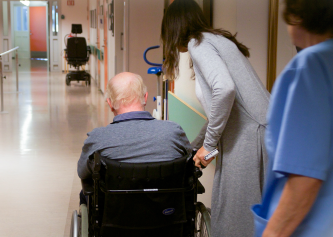Elzbieta M. Gozdziak and Izabella Main write about Polish nurses in Norway and how they experience periods of precarity.
By Elzbieta M. Gozdziak and Izabella Main

The notion of precarity has gained considerable prominence in migration studies. The dominant trend in contemporary migration scholarship focuses on precarity of the most vulnerable – low-wage, poorly trained migrants – whose precarity is often associated with ‘illegality’ and ‘deportability.’ As health professionals and citizens of the European Union, Polish nurses in Norway are neither low skilled nor without appropriate authorization. Yet, they too experience periods of precarity.
The most precarious is the situation of newly arrived nurses who have secured their jobs with the help of recruitment agencies. Don’t get us wrong, many of the nurses we interviewed spoke highly of the assistance they received from various recruiters. Some thought that without the assistance of recruitment agencies they would have never been able to get a job in Norway. At the same time, recruiters are not always able to place Polish nurses in a full-time employment, be it in a hospital, a clinic, or a nursing home. Rather, recruiters line up a series of assignments. Sometimes the assignments are several weeks or months long, but often they are of a much shorter duration. As a result, there is a lot of “stand-by” time between assignments. Most nurses go to Poland to stay with family if the “stand-by” time is longer than a couple of days. Those who are provided with housing, often have to vacate the room or apartment as they await a new placement.
New work assignments often mean frequent moves between localities. We have met nurses who worked in several far-flung cities and towns during the first year or two in Norway. The nurses who have partners and/or children, especially children of school age, leave them behind in Poland to ensure continuity of education. It would be impossible to expect partners and children to move around Norway every few weeks or months to accommodate the changing employment of the nurses.
Most Polish nurses start working in nursing homes where they care for basic needs of their patients – provide assistance with bathing, getting dressed, and feeding – without ever utilizing their sophisticated nursing skills. Among our interviewees were nurses with advanced specializations in pediatric or oncological nursing, but as one of the nurses put it: “I hardly ever do any nursing work (praca pielęgniarska), most of the time I care for people’s basic needs (praca pielęgnacyjna).” Some worried that they would forget “how to be a real nurse.”
These precarious situations seem to be offset by the wages Polish nurses command in Norway. By comparison with Polish wages, the earnings seem exorbitant in the eyes of the nurses (and their families in Poland). Many nurses spoke about the ability to earn even more if one is willing to work overtime or work at night. Indeed, several nurses we interviewed worked every possible shift they could to save as much money as they could and go back to Poland to buy an apartment or build a house.
Interviews with more established nurses indicate that they managed to improve their professional position in Norway by negotiating new contracts, foregoing recruitment agencies and signing contracts directly with hospitals or other healthcare facilities, acquiring tacit knowledge, and developing networks of support. But this is a topic for another blog.